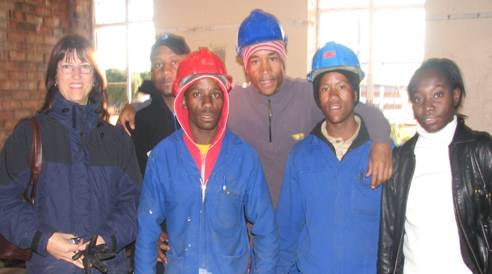Youth volunteering for development [1]
By Rejoice Shumba
 |
|---|
Helene Perold, Executive Director of VOSESA (left), and Rejoice Shumba, Project Co-ordinator of VOSESA (right), with participants from a National Youth Service project in Warrenton, in South Africa’s Northern Cape Province. These volunteers are part of a group of young people that are reconstructing a community centre in the town. They are not only assisting the community, but also developing their own skills by gaining invaluable experience in construction. |
Youth involvement in volunteering can contribute to meeting the Millennium Development Goals timeously.
This is the implication of the World Bank’s 2007 World Development Report, which notes that seven of the eight Millennium Development Goals have outcomes that relate to young people and that even where young people are not the focus of the goals, their involvement can be important to their achievement.
Youth volunteering is a strategy for engaging young men and women in a range of activities that can improve youth participation and harness their energy, vigour and creativity to contribute to the achievement of national and global development goals. Volunteering can be defined as instances in which young people, of their free will and without financial gain as their primary objective, carry out activities with two main aims:
• the development of communities and society in general; and
• their own personal development, which in turn contributes to their ability to participate in society as responsible adults.
The importance of involving youth meaningfully in volunteer projects stems partly from the large youth populations in developing countries, and from the extensive needs associated with the development of local communities. In South Africa, young people constitute about 41 per cent of the population. This is similar to many African countries, where youth make up the majority of populations. Young people are characterised by energy and talent which, if harnessed appropriately, can be directed toward their countries’ development at minimal cost.
Creating the right environment for youth to volunteer for development can be facilitated by a number of factors. According to a paper presented by UNV to a meeting of the Economic Commission for Africa convened in Addis Ababa in November 2006, two important issues impact directly on youth volunteering for development. These are:
- strategies for preparing, training and debriefing volunteers need to be planned and strengthened; and
- volunteers must be provided with structured learning opportunities within the programme.
If young people are to learn about social and personal development from their volunteering experience, the experience should include at least these two features.
Factors likely to facilitate youth volunteering
The potential contribution that can be made to development by youth volunteering cannot be over-emphasised, but is dependent on a number of factors:
- a culture supportive of youth volunteering and development;
- the strength of civil society organisations, as demonstrated by the presence of youth groups and non-governmental organisations active in society; and
- youth being inspired to volunteer for development.
While a culture supportive of youth volunteering is a necessary condition, it is not sufficient for success. Success factors include youth aspirations, the socio-economic context in which young people function, the opportunities available for youth volunteering, an understanding of young people, and the expertise with which youth volunteering opportunities are structured and managed.
Factors likely to constrain youth volunteering for development
Issues that are likely to inhibit youth involvement in volunteering include a lack of information about youth volunteering opportunities and lack of access to the opportunities themselves. These relate to the affiliation, location or skills levels of young people.
While it is critical to communicate who is eligible for potential programmes and how they can engage with the opportunities available, it is also clear that once young people are aware of a volunteering initiative, a flood of applications may result. Consequently, the capacity to manage the recruitment of applicants is important.
Examples of youth volunteering for development in Africa
Initiatives for youth volunteering are already underway in various countries. The sectors in which young people are volunteering for development range from eco-volunteering (Mali), HIV/AIDS (Benin and South Africa) and food security (Sierra Leone), to district-level capacity building for local government (Mozambique).
Other African examples come from Niger, where government and civil organisations are working with international partners, through a two-phase process, to establish the legislative context and operational mechanisms to strengthen youth volunteering. In Kenya, a major youth policy initiative is in the process of development, within which youth volunteering can be fostered. Burkina Faso is putting in place the infrastructure for the launch of a national corps of Volunteers for Development.
In addition to using public policy to shape the volunteering context, there are examples of programmes that can contribute to the growth of an enabling environment for youth volunteering for development, as is the case in Mali and Cape Verde.
There is a growing interest in youth volunteering for development. The reasons for this vary in different countries, but they include international concern about the vulnerability of youth to social issues such as unemployment, poverty and HIV and AIDS, as well as the renewed interest (expressed through international agencies such as the Commonwealth and the United Nations) in fostering youth participation in emerging democratic structures.
The youth who participate in such initiatives also stand to benefit immensely in terms of their personal development. For all these reasons it seems that there is a strong case for governments and civil society organisations to create a much wider range of structured volunteer opportunities for young people to volunteer.
[1] This article is based on a paper presented by United Nations Volunteers to a meeting of the Economic Commission for Africa convened in Addis Ababa in November 2006. The drafting of the paper was supported by VOSESA.